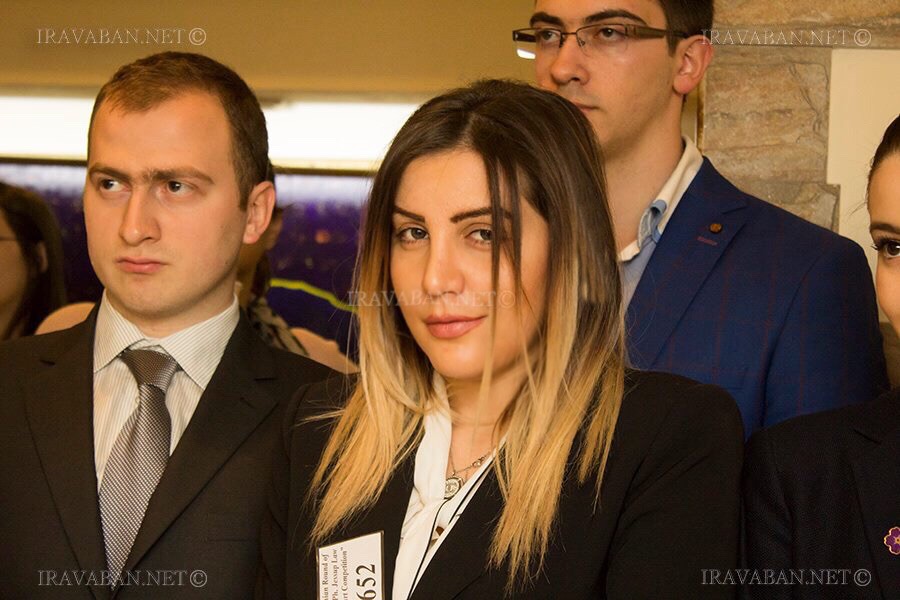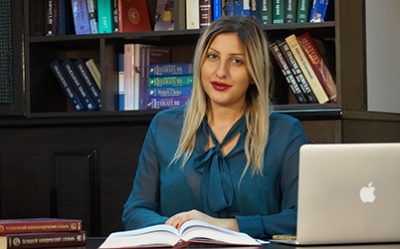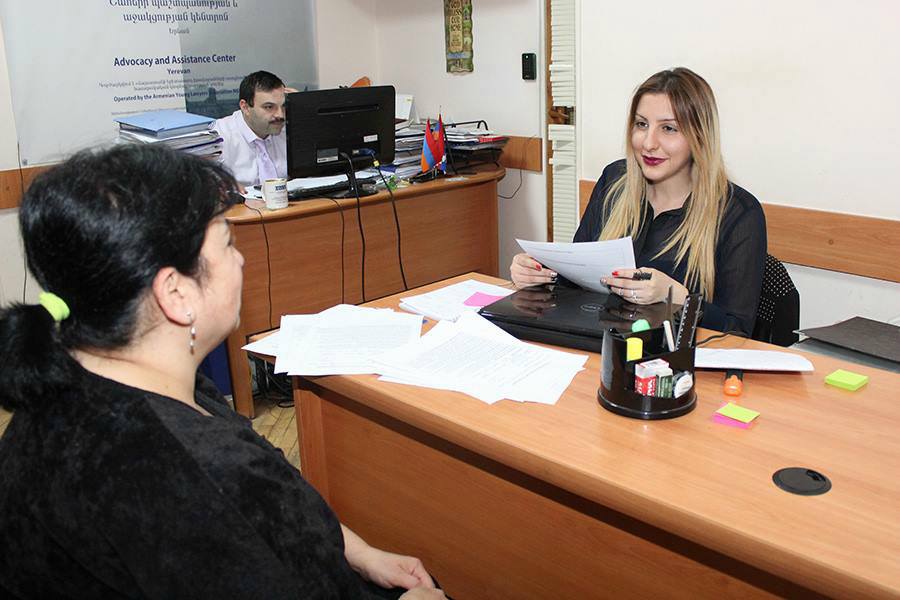Mariam Zadoyan, a young lawyer, says that her childhood was spent in a legal environment. First, detective literature, then “legal seminars” – this is how this profession was sown.
“It’s easy to accuse, but difficult to defend,” Mariam decided to become a lawyer who succeeded based on this principle. She sees herself in the private sector.
The interview with the young lawyers touched her preferences, problems existing in the legal sector and other issues.
Details in the regular interview of the “Young Lawyers” series.
– Why and how just law?
– I grew up in a family of lawyers, that is, my childhood was spent in a legal atmosphere. I remember participating in various legal discussions, seminars and gradually it became close to my heart. It’s easy to accuse, but difficult to defend, so I just wanted to be a lawyer, because I have noticed this vein in me since childhood when I always played the role of a defender and mediator in between my friend.
– Where did you study?
– In 2013, I graduated from the Faculty of Law of the French University in Armenia, thanks to my high background, filling the ranks of the best 5% of the course for years. Further, in 2016, I received my Master’s degree from the American University of Armenia. Simultaneously, in 2015-2016 I studied at the School of Advocates of the RA. Since 2016, I am PhD student at the Chair of Civil and Civil Procedure Law of the Armenian-Russian Slavonic University. Currently, I am a lawyer at “LIGEL ALLIANCE” Law Firm.
– Which spheres are close to your heart?
– Corporate law is very close to my heart, this branch of newly developing law in the Republic of Armenia, besides, I also like other spheres of financial and civil law.
– Mariam, this year you participated in the Philip Jessup Law Moot Court Competition, you were in the United States, what did that experience give you?
Այս տարի բեկումնային էր Ֆիլիպ Ջեսափի անվան միջազգային իրավունքի դատախաղ-մրցույթի համար
– It is impossible to explain in one sentence how much skills and knowledge that competition gave me. First of all, you get acquainted with professionals from different countries, because there are participants from about 100 countries of the world. In addition, you get important skills on how to appear in court. It is in this area that our country is failing. I would like to note that we have won three of the four games in the United States, which is the best result of Armenia so far recorded by the Armenian team. We have not failed professionally and legally, the main shortcoming has been the lack of skills in the process of presenting our knowledge to judges. There were even teams that were inferior to us in terms of professional knowledge, but they were gaining points due to their ability to appear in court.
– You said you have studied in several universities, I think you have experience to understand the nature of a lawyer’s education to fully master the profession.
– There are many problems in our university system from this point of view. Lectures are mostly theoretical and are not accompanied by practical skills. For  example, a lawyer has started working on contracts, internal legal acts, and litigation if a person begins his or her career in a law firm. When I graduated with a bachelor’s degree from the French University in Armenia, we did not pass such a course, though it is currently being taught, which was a gap to me was really, and which I replenished by self-education, as well as the studies at the School of Advocates of the RA. However, there are currently few universities that teach legal writing/correspondence. In my opinion, the most important task of our university system is not the provision of theoretical knowledge, which the student can obtain by reading textbooks, but the teaching of judicial practice, the presentation of the latest precedents, in short – the provision of practical skills.
example, a lawyer has started working on contracts, internal legal acts, and litigation if a person begins his or her career in a law firm. When I graduated with a bachelor’s degree from the French University in Armenia, we did not pass such a course, though it is currently being taught, which was a gap to me was really, and which I replenished by self-education, as well as the studies at the School of Advocates of the RA. However, there are currently few universities that teach legal writing/correspondence. In my opinion, the most important task of our university system is not the provision of theoretical knowledge, which the student can obtain by reading textbooks, but the teaching of judicial practice, the presentation of the latest precedents, in short – the provision of practical skills.
– Today, law is a fashionable profession as well as it is expensive. Is just getting an education enough to become a lawyer?
– It is not enough justy for a profession, in any profession you have to be the bearer of the values of that profession. If you become a lawyer, you must be a bearer of the values of justice and honesty, otherwise no matter how much money you have, it will not help you. During my school years, I have met many people whose parents forced them to study law against their will, but they did not become good professionals at all or eventually chose a second profession. I strongly believe that if law is not the profession of the human heart, and he\she does not enjoy the daily activities, but by the force of inertia, then there is no need to go through that route.
– You have worked for a long time at the Yerevan Anti-Corruption Center of the Armenian Lawyers’ Association, where citizens come to consult on various issues. What is the key to communicating with citizens?

– I think that currently in universities it is necessary to teach cancelling skills to the students and how to provide legal advice to citizens. Providing advice is not as easy as it seems. Many citizens come to this or that state body to voice their problems and found no solution, they come dissatisfied and discouraged. The most important thing is to listen to them, not to show that you are listening. You need to listen actively, try to understand the person and show compassion. Citizens often present problems that are beyond the scope of our legislation, but they need to be heard and to be explained. Believe me, it can be a cure for their wounds. In our practice, there have even been cases when citizens wanted to attempt self-immolation, entered the counseling room with a knife, but we have always listened to their problems, calmed them down and guided them, so they were happy to leave the center. I should also mention that often the problems depend on the low level of legal awareness of the citizens.
– Mariam, you also participated in the development of an Alternative Report on the Legal Monitoring of the Implementation of the UN Convention on the Elimination of All Forms of Discrimination against Women. Please briefly present what prevents a woman from having equal rights in our country as a man, and, most importantly, will be able to fully influence public and political life.
– In reply to the first question, I would like to say that the primary obstacle is stereotypes, but more and more women are becoming more aware and demanding. The problem is not so much in raising the legal awareness of women as in men. I should also mention that we had meetings in different regions while preparing the report. It is noteworthy that the situation is different in each region, for example, in Gavar there could be no word related to equal right of women and men, whereas in Kapan the picture was different. There, women felt themselves more dignified. There are two solutions to the problem of political participation. Due to our efforts in the legislative aspect, we have achieved that the quota for women’s participation in the National Assembly and local government elections will gradually increase. However, one problem still remains unresolved: the legislation provides for the number of women to participate in the party’s lists, but not for the seats in the National Assembly. This is called the product equality quota, which is used in some countries and has a positive shift. It is desirable that in our parliament, for example, when Arpine Hovhannisyan became the Minister of Justice of the Republic of Armenia, the number of women deputies in the National Assembly decreased by one, because a man took her place. Often women are elected to the National Assembly, resign, and are replaced by men, and changes must be made in this regard as well. For example, when Arpine Hovhannisyan became the Minister of Justice of the Republic of Armenia, the number of women deputies in the National Assembly decreased by one, because a man took her place. Often women are elected to the National Assembly, resign, and are replaced by men, and changes must be made in this regard as well.
– What are the problems that exist in the declaration institute of high-ranking officials in your opinion?
– As an expert in this field, I have done research. At present, it is not the officials who are wrongly declaring, but our declaration system has so many shortcomings that even if you submit a declaration, it is difficult to get the right picture of the official’s property and income. For example, the legislature does not currently set clear requirements for cost savings, and the whole international practice suggests that costs (expensive travel, money for education in expensive foreign educational institutions) should also be declared so that people can compare the official’s cash flow and inflows. And to ask where the official gets so much wealth when the income is lower and the expenses are several times higher. The current system does not allow it. It is necessary to criminalize the crime of “illicit enrichment” under the UN Convention against Corruption, when the official himself is obliged to prove that his income was obtained legally. Only in this case, the institute of declaration will justify itself. In addition, not all officials declare their income in Armenia, but there are a number of areas that directly involve corruption risks, so there is a need to expand the scope of persons that should provide property and income declaration.
– Which for example?
– For example, the police system. In cases where officials are in direct contact with citizens. In addition, the minor children of officials do not declare, but only the adults submit a declaration, and only in case if the child lives with the family. Naturally, we see that it is possible for an official to register all his property in the name of an adult child, and we will not have a clear picture of the official’s property and income. In addition, it is no secret that the mothers-in-law of many officials in Armenia, for example, are much richer than the officials themselves (laughs), so there is a need to impose property and income declarations on their close relatives as well.
– Let’s move on to other issues. What is the philosophy of your life?
– You should try to live in such a way that you will never regret the steps you have taken. In addition, freedom is one of the most important values for me.
– What literature do you like?
– I have no preferences regarding a particular genre, I like detective, adventure, historical, fantastic literature, romances, etc. I can only point out a few books that have a special place for me. From an early age, my favorite book was the Harry Potter series. I really like the literature of Agatha Christie and Georges Simenon. In general, I really like reading and I am sorry that many people today don’t consider it “fashionable”.
– What hobbies do you have?
– I have attended many different clubs from a young age, I have been involved in Latin American dances, participated in competitions, played lawn tennis, equestrian sports, macro-work, and tapestry. One of the hobbies is traveling, I like to explore new countries and cities.
Also read:
“There is much Foam in the Legal System of Armenia” – Young Lawyer
Interview by Gevorg Tosunyan
Photos by Aleksander Sargsyan
















